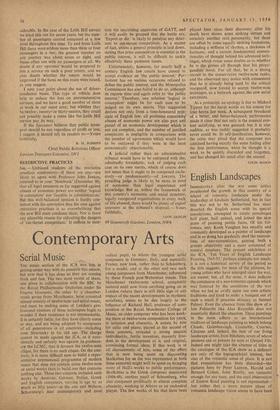RESTRICTIVE PRACTICES
Slit, — Unbiased students of the restrictive practices controversy—if there are any—are likely to agree with Professor John Jewkes, referred to in your 'Notebook' (December 30), that all legal measures so far suggested against abuses of economic power arc neither 'logical in conception' nor 'feasible in administration.' But this well-balanced opinion is hardly con- sistent with his conviction that the case against restrictive practices is so overwhelming that the new Bill must condemn them. Nor is there any plausible reason for ridiculing the dangers of 'cut-throat competition.' It suffices to men-
tion the unyielding apparatus of GATT, and it will easily be grasped that the battle cry, 'Export or die,' is likely to paralyse any deter- rent to cut-throat competition. As a matter of fact, unless a general principle is laid down, stating that price competition is essential in the public interest, it will be difficult to tackle effectively these pertinent issues.
Unfortunately, however, for nearly half a century English law courts have ceased to accept evidence on 'the public interest,' Par- liament has on various occasions refused to define the public interest, and the Monopolies Commission has also failed to do so, although its reports time and again refer to 'the public interest' Therefore, one solution 'logical in conception' might be for each case to he judged on its own merits. This - suggestion derives not only from a time-honoured prin- ciple of English law; all problems concerning abuses of economic power are also part an'd parcel of an economic development which is not yet complete, and the number of justified complaints is negligible in comparison with the number of agreements which would have to he outlawed if they were in the least economically objectionable.
A judicial rather than an administrative tribunal would have to be entrusted with the, admittedly formidable, task of judging each case on its own merits, which of course does not mean that it ought to be composed exclu- sively—or predominantly—of lawyers. The presiding judge is likely to be more in need of economic than legal experience and knowledge. But as, within the framework of this country's economic and social structure, legally recognised organisations in every walk of life abound, there would be plenty of expert' assessors at the tribunal's disposal. — Yours faithfully,


































 Previous page
Previous page